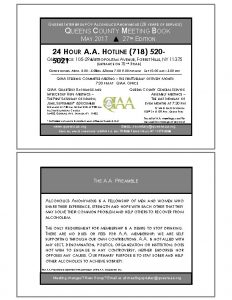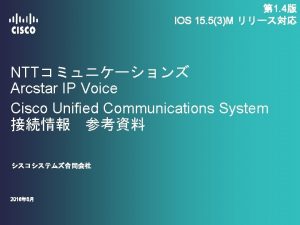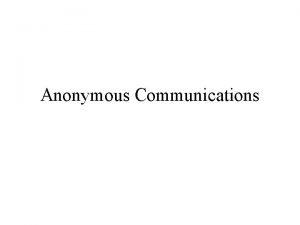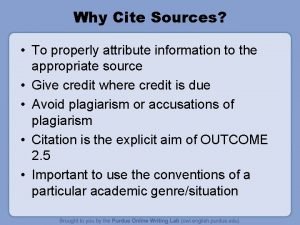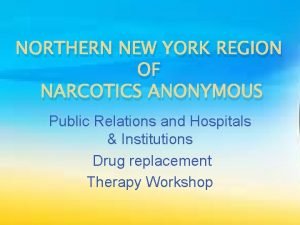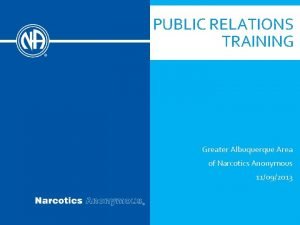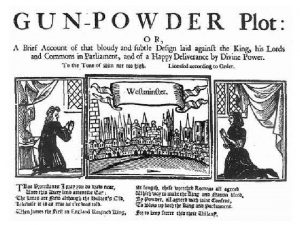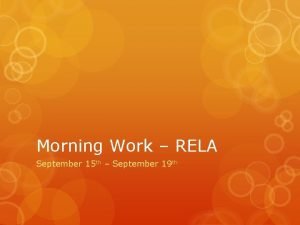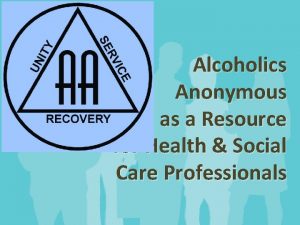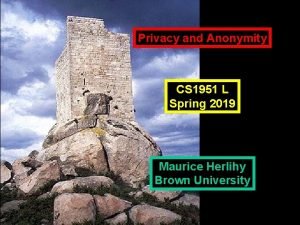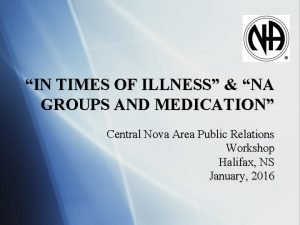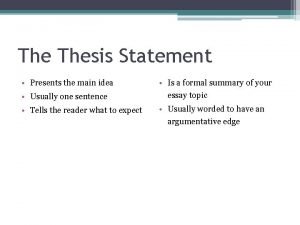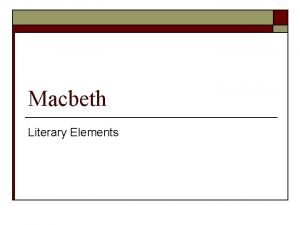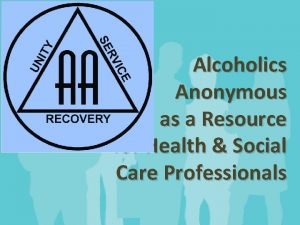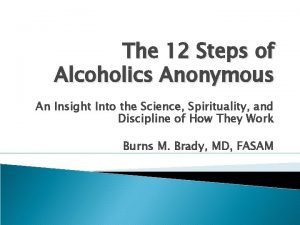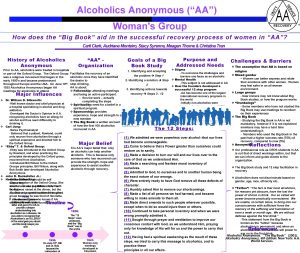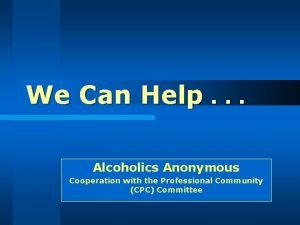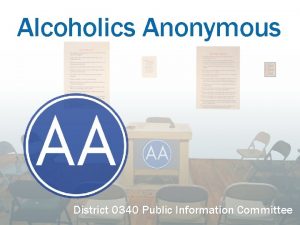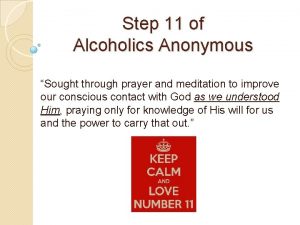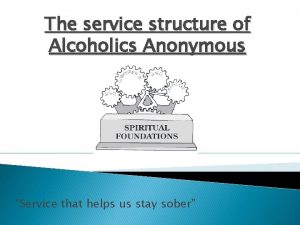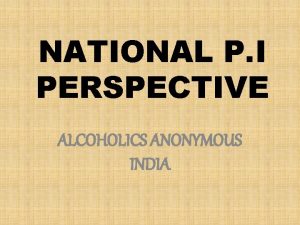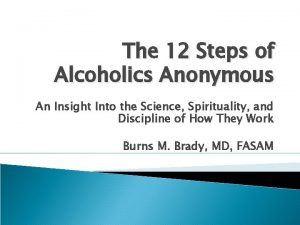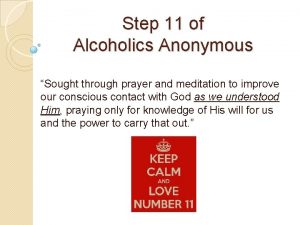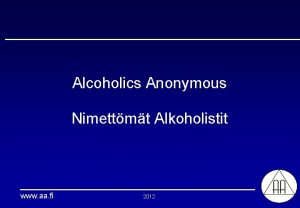Area 81 Alcoholics Anonymous Presents The Twelve Concepts































- Slides: 31

Area 81 Alcoholics Anonymous Presents The Twelve Concepts For World Service Copyright © 1962 Alcoholics Anonymous World Services, Inc. All rights reserved

“The Twelve Concepts: History and Purpose” Our Steps help us in Recovery, Traditions in Unity and the Concepts lend depth to the Legacy of Service. There are some wonderful resources: our “AA Service Manual combined with The 12 Concepts of World Service” , The pamphlet “ The Twelve Concepts for World Service, Illustrated”, and the “Concepts Checklist” to name a few. We will refer to all of these documents as we move through the presentation. I also used the Digital Archives on aa. grapevine. org. An article from 1985 written by C. C. in West Palm Beach shares: “A concept is a thought, an idea, a visualization of what can be…Bill and Bob gave us their dream and trusted us to make it a reality. ” To begin, I would like to read some of the Introduction to the Concepts, found in the back of the AA Service Manual:

The Concepts are an interpretation of A. A. ’s world service structure as it emerged through A. A. ’s early history and experience. They reveal the evolution by which it has arrived in its present form, and they detail the experience and reasoning on which our operation stands today. These Concepts therefore aim to record the “why” of our service structure in such a fashion that the highly valuable experience of the past, and the lessons we have drawn from that experience, can never be forgotten or lost…….

We are sure that each new group of workers in world service will be tempted to try all sorts of innovations that may often produce little more than a painful repetition of earlier mistakes. Therefore, it will be an important objective of these Concepts to forestall such repetitions by holding the experiences of the past clearly before us. And if mistaken departures are nevertheless made, these Concepts may then provide a ready means of safe return to an operating balance that might otherwise take years of floundering to rediscover. ”

A little later in the Introduction we learn: “Well knowing our own propensities for power driving, it is natural, and even imperative, that our service concepts be based on the system of “checks and balances. ” The “Twelve Concepts for World Service” were written by Bill W. in 1959 and published in 1962; a “short form” of the Concepts was approved by the 1971 General Service Conference, and in 1974 the “Twelve Concepts for World Service” was approved for inclusion in The AA Service Manual.

“In 1937, the Akron and New York Groups authorized Doctor Bob and me to create overall services which could spread the AA message worldwide. Those two fledgling groups gave to us the authority to create and manage world services. Following their action, we held both the final responsibility and the immediate authorization to get this project under way and keep it going. On our own, however, we knew we could do little, and so we had to find trusted servants who in turn would help us. ” – Bill W

In 1938, Bill and Bob commenced work on the world service structure. The first step was the creation of a trusteeship for AA as a whole which was called the Alcoholic Foundation. In 1954, this Foundation was renamed the General Service Board of Alcoholics Anonymous. The General Service Conference then assumed the leadership role vacated by our co-founders. With all these components, which of these entities were supposed to do what? Who was in charge? What were their responsibilities? What were their rights? ” It is important to note that the Twelve Concepts are a potpourri. “Concepts 3 through 5, 9 and 12 deal with spiritual principles” and the remainder “are devoted to describing the relationship of the various service entities and how they work together. ” The Concepts are about Equality and Inclusiveness. Think about this: Our very lives, as ex-problem drinkers, depend upon our constant thought of others and how we may help meet their needs. (BB/pg. 20, “There is a Solution”) We are Responsible…. .

Concept I The final responsibility and ultimate authority for A. A. world services should always reside in the collective conscience of our whole Fellowship. In 1948, people learned that Dr. Bob was suffering from a fatal illness. Bill shares that it became very apparent that Dr. Bob and he were almost the sole links between our virtually unknown Trustees and the movement they served. …For the first time it was seen that only a representative conference could take the place of Dr. Bob and Bill, so the first conference was held in 1951 on a trial basis. Bill says in the Concept 1 essay: “But at St. Louis in 1955, we knew that our General Service Conference – truly representing the conscience of AA world-wide – was going to work and work permanently. The A. A. groups today hold ultimate responsibility and final authority for our world services — those special elements of over-all service activity which make it possible for our Society to function as a whole. The groups assumed that responsibility at the St. Louis International Convention of 1955. We have the responsibility and the authority which means for our collective conscience to work, we all need to be involved! “The whole fellowship” having the responsibility and authority for AA’s world services was well-placed. But does your home group have a General Service Representative? Your group becomes part of this collective conscience of our whole Fellowship through your GSR as the participating link at District and Area assemblies.

Concept 2 When, in 1955, the AA groups confirmed the permanent charter for the General Service Conference, they thereby delegated to the Conference complete authority for the active maintenance of our world services and thereby made the Conference – excepting for any change in the Twelve Traditions or in Article 12 of the Conference Charter – the actual voice and the effective conscience for our whole Society. These first two concepts embrace and affirm the principle of Tradition 2: “For our group purpose there is but one ultimate authority…a loving God as He may express Himself in our group conscience. Our leaders are but trusted servants…they do not govern. ” This Concept starts out with: “It is self-evident that the thousands of AA groups and the many thousands of AA members, scattered as they are all over the globe, cannot of themselves actually manage and conduct our manifold world services. The group conscience is out there among them, and so are the needed funds. ” Through the General Service Structure, the group’s voice is delegated to the General Service Representatives (GSRs), who are elected from each group, through the District Committee Members (DCM’s) who are elected through our districts, to our Delegate who is elected at our Area Assembly who then takes our voice to the General Service Conference. This body is the forum by which our General Service Board listens to the conscience of the fellowship and the determined action to be taken - the very essence of our 5 th Tradition – effectively carrying the message to the still suffering alcoholic.

These actions taken help us carry out the services that are important to our twelfth step work: uniform literature, uniform public information about AA, helping groups get started, handling pleas for help, carrying the message in other languages etc. Point to ponder: Part of the responsibility of delegating authority is to provide the support to make it happen. Do we understand our groups’ wider Seventh Tradition responsibilities? Are we willing to fund what we are asking them to do? Our next three Concepts are pivotal spiritual principles from the Steps and Traditions. They can be found in our groups, in our places of business, in our homes. They are Traditional Rights of Decision, Appeal, and Participation.

Concept III As a traditional means of creating and maintaining a clearly defined working relation between the groups, the Conference, the AA General Service Board and its several service corporations, staffs, committees and executives, and of thus insuring their effective leadership, it is here suggested that we endow each of these elements of world service with a traditional “Right of Decision. ” Why would we elect someone to a position if we didn’t trust them? We have arrived at a group conscience and passed that conscience on to our trusted servants. Remember, though, Concept I speaks to the “collective conscience of our whole fellowship!” We must trust our trusted servants to “act according to the best dictates of their own judgment and conscience at that time” and oftentimes it’s based on new information that wasn’t available earlier. The Right of Decision that we offer them is not only the practical means by which they may act and lead effectively, but it is also the symbol of our implicit confidence. The Right of Decision is certainly a two-way street. We must trust and respect and be responsible. As a trusted servant, and as a member of AA, we are accountable. It’s very important to share our thoughts on a topic. The more minds we have talking about how we can better fulfill our purpose, the more options will arise. Also, without the right and freedom to decide, little or nothing would get done. How would it work with 93 delegates to the General Service Conference if every time they learned another viewpoint, they had to go back to their areas and committees and say well, what do you think about that?

Remember, our fellowship is not going to fail because of one vote. We can always bring the topic back again next year if somehow it doesn’t turn out to be as brilliant as we thought it was at the time. Examples: ● When we elect someone to a position in the group, district or area, we trust them. We never have to instruct them. They are part of a collective conscience as they grow in their service. They might not make coffee like me, but they make coffee. Trust and support. ● We decide when it is appropriate to utilize “Right of Decision” and when the importance of an item ought to be brought back to the Group

Concept IV Throughout our Conference structure, we ought to maintain at all responsible levels a traditional “Right of Participation, ” taking care that each classification or group of our world servants shall be allowed a voting representation in reasonable proportion to the responsibility that each must discharge. The Twelve Concepts Illustrated does a nice job explaining this concept. The principle of “Right of Participation” is built into the General Service Conference through the Conference Charter. Voting members include not only delegates, but also the trustees, and the directors and staff members of AA World Services (i. e. GSO) and the AA Grapevine. The Chairperson of the General Service Board appoints non-trustee members to the standing committees in order to have the advantage of their expertise, and staff members serve as committee secretaries. There are no ‘superiors’, no ’inferiors, ’ and no ‘advisors’. While everyone that attends committee meetings are important participants, they are not all voting members. In the AA Service Manual , in Bill’s essay on Concept 4, we read “…another good reason for “participation” and this one has to do with our spiritual needs. All of us deeply desire to belong. We want an AA relation of brotherly partnership. It is our shining ideal that the "spiritual corporation" of AA should never include any members who are regarded as "second class. " Deep down, I think this is what we have been struggling to achieve in our world service structure. Here is perhaps the principal reason why we should continue to ensure "participation" at every important level. Just as there are no second-class AAs, neither should there be any second-class world service workers. ”

“The "Right of Participation" is therefore a corrective of ultimate authority because it mitigates its harshness or misuse. It also encourages us who serve AA to accept the necessary disciplines that our several tasks require. We can do this when we are sure that we belong, when the fact of our "participation" assures us that we are truly the "trusted servants" described in AA's Tradition Two. ” Example I like the idea that the spirit of a traditional “Right of Participation” is rooted in my home group – you are an alcoholic if you say you are; my home group is your home group if you say it is and you have a vote at our group if you have been sober 8 months or 8 years

Concept V Throughout our world services structure, a traditional “Right of Appeal” ought to prevail, thus assuring us that minority opinion will be heard and that petitions for the redress of personal grievances will be carefully considered. Every member has a voice! Even after extensive discussion and a vote where substantial unanimity is reached, we ask for the minority opinion. The really interesting minority opinions are those where someone says “Oh gosh, but what about this? . . . ” Something that hasn’t been articulated previously that certainly could make us pause and reconsider. I watched this happen at a General Service Conference and it is truly a wonderful thing to witness! The Right of Appeal recognizes that minorities can be right. While that is not always the case, the minority opinion makes us really think about our actions and whether they are the very best for the fellowship as a whole. It is also written that “the wellheard minority, therefore, is our chief protection against an uninformed, misinformed, hasty or angry majority. ” Does our group understand the importance of all points of view being heard before a vote is taken? Do I know that if I'm disturbed by an action of the Conference, it is my responsibility to question it, discuss it with others, and make my voice heard through the "Right of Appeal"?

Minority Opinion, Right of Appeal and Petition for Redress allow all of the voices at the table to be heard. It allows us to love each other unconditionally at all times. We must discuss until we have emptied ourselves of everything, as the General Service Office, says. We must be slow and thoughtful in our discussion. Also, we must guard against stifling God’s will for us because of the clock. It is better to table an item than to rush to an unsatisfactory conclusion. As my service sponsor always reminded me, a knee jerk reaction in AA can be 4 – 5 years. The next three Concepts, 6 – 8, are a description of the incorporation of our structure under New York Law and describe the relationships of these entities. These relationships are built by law, but filled by spirit. With the limited time we have, we are not going to dwell on these Concepts, but I did find them to be filled with interesting and meaningful tidbits of “who knew” information. I also concede that everyone will not have an appetite for these details. But, hopefully enough of you do as it is vital to the health of Alcoholics Anonymous.

Concept VI On behalf of AA as a whole, our General Service Conference has the principal responsibility for the maintenance of our world services, and it traditionally has the final decision respecting large matters of general policy and finance. But the Conference also recognizes that the chief initiative and the active responsibility in most of these matters should be exercised primarily by the Trustee members of the Conference when they act among themselves as the General Service Board of Alcoholics Anonymous. Bill makes the point that although “our objective is always a spiritual one, ” nevertheless our world service is a “large business operation. ” “Indeed, ” he says, “our whole service structure resembles that of a large corporation. The AA groups are the stockholders, the delegates represent them, like proxy holders, at the annual meeting; the General Service Board Trustees are actually the directors of a ‘holding company. ’ And this holding company (the General Service Board) actually owns and controls the two ‘subsidiaries’ (AAWS and the AA Grapevine) which carry on the…services. “This very real analogy makes it…clear that, like any other board of directors, our trustees must be given large powers if they are to manage the…affairs of Alcoholics Anonymous. ”

Concept VII The Conference recognizes that the Charter and the Bylaws of the General Service Board are legal instruments: that the Trustees are thereby fully empowered to manage and conduct all of the word service affairs of Alcoholics Anonymous. It is further understood that the Conference Charter itself is not a legal document: that it relies instead upon the force of tradition and the power of the AA purse for its final effectiveness. This Concept attempts to clarify the relationship and “balance of powers” between the Conference and the General Service Board. “This…may look like the collision of an irresistible force with an immovable object. ” On the one hand, “the board is invested with complete legal power over AA’s funds and services; on the other hand the Conference is clothed with such great influence and financial power it could overcome the legal rights of the board. “Thus, the practical power of the Conference is, in the final analysis, superior to the legal power of the board. ”

Concept VIII The Trustees of the General Service Board act in two primary capacities: (a) With respect to the larger matters of over-all policy and finance, they are the principle planners and administrators. They and their primary committees directly manage these affairs. (b) But with respect to our separately incorporated and constantly active services, the relation of the Trustees is mainly that of full stock ownership and of custodial oversight which they exercise through their ability to elect all directors of these entities. Long experience has proven that the board “must devote itself almost exclusively to the larger questions of policy, finance, group relations and leadership…In these matters, it must act with great care and skill to plan, manage and execute. ” The board, therefore, must not be distracted or burdened with the details or the endless questions which arise daily in the routine operation of the General Service Office or the publishing operations, including the Grapevine. “It must delegate its executive function” to its subsidiary, operating board.

Concept IX Good service leaders, together with sound appropriate methods of choosing them, are at all levels indispensable for our future functioning and safety. The primary world service leadership once exercised by the founders of AA must necessarily be assumed by the Trustees of the General Service Board of Alcoholics Anonymous. Our General Service Sponsors encourage us to read Bill’s Essay on Concept 9, with particular attention to Leadership in AA: Ever a Vital Need , as we make ourselves available for upcoming service positions. You may equate leadership with a general service position, but I would like to read the last few paragraphs from this Concept: “While this article (Leadership in AA…) was first thought of in connection with our world service leadership, it is possible that some of its suggestions can be useful to anyone who takes an active part in our Society. This is true particularly in the area of Twelfth Step work, in which nearly all of us are actively engaged. Every sponsor is necessarily a leader. The stakes are about as big as they could be. A human life and usually the happiness of a whole family hang in the balance. What the sponsor does and says, how well he estimates the reactions of his prospects, how well he times and makes his presentation, how well he handles criticisms, and how well he leads his prospect on by personal spiritual example – these qualities of leadership can make all the difference, often the difference between life and death. If anybody has ever been on a 12 th step call, you’re a leader, that’s the very top of leadership – being able to give that gift of time, effort and experience to another alcoholic.

Now that we recognize we are all leaders in Alcoholics Anonymous, let’s look at some of the General Service Leadership. The GSR is the service leader for his or her group and is a vital link between the group and AA as a whole. Due to AA’s principle of rotation, furnishing our service structure with able and willing workers has to be a continuous effort and cannot be taken lightly. I get concerned when I hear it reported about the fellow that had one too many cups of coffee during group elections and upon returning from the restroom he discovers he was elected to the position of GSR – meaning he was just granted the Traditional Right of Decision, Participation and Appeal? So, was this election determined by careful deliberation? Or a weak bladder? You decide. Good leaders understand it’s about working together. Great ideas come from anybody, anywhere. Good leaders take actions within the framework of defined authority and responsibility. Good leaders understand compromise while maintaining firm convictions and leading by example. Good leaders find a place where we can all be in agreement. Leaders exercise our vision.

Things to consider: ● Does our group discuss how we can best strengthen the composition and leadership of our future trusted servants? ● What are our criteria for election? ● Do I set a positive leadership example?

Concept X Every service responsibility should be matched by an equal service authority – the scope of such authority to be always well defined whether by tradition, by resolution, by specific job description or by appropriate charters and bylaws. Concept 10 is an extension of Concept 3, the Right of Decision. Concept 10 challenges our ability to match service responsibility with equal authority so that a trusted servant can fulfill the well-defined tasks expected of that member. It is always important to carefully select members of committees, elected officers, or any other doing the work of AA so that we have the best qualified.

Concept XI While the trustees hold final responsibility for AA’s world service administration, they should always have the assistance of the best possible standing committees, corporate service directors, executives, staffs and consultants. Therefore, the composition of these underlying committees and service boards, the personal qualifications of their members, the manner of their induction into service, the systems of their rotation, the way in which they are related to each other, the special rights and duties of our executives, staffs and consultants, together with a proper basis for the financial compensation of these special workers, will always be matters for serious care and concern. This is another relationship of entities Concept, like Concepts 6 – 8. Bill explains in great detail the composition, functions and relationships of the standing committees of the General Service Board, its subsidiary operating boards, the General Service Office and the AA Grapevine as they existed in 1962. Certainly some of those things have changed, but there are some valuable components that we still need to understand today. We want the best possible, not just “good enough”. Human lives are in the balance here.

We recognize that we do need special workers. Remember the Eighth Tradition, these workers should be justly paid. Rotation is good. It will keep it fresh. Rotation, especially when you can’t see anyone else ‘qualified’ to do the job as well as you…. If you think you ‘own’ that service, well, then rotation is necessary for our growth, a step into humility which is the spiritual essence of anonymity.

This Concept also states that we expect the Trustees to take this whole thing VERY SERIOUSLY! In fact, words most commonly used in describing the role of trustees are Serous Fiduciary Responsibility – for the decisions they make with regard to the “corporate assets” and “rights” of stockholders – Us!

Concept XII General Warranties of the Conference in all its proceedings, the General Service Conference shall observe the spirit of AA tradition, taking great care that it never becomes the seat of perilous wealth or power; that sufficient operating funds, plus an ample reserve, be its prudent financial principle; that none of the Conference Members shall ever be placed in a position of unqualified authority over any of the others; that all important decisions be reached by discussion and whenever possible, by substantial unanimity; that no Conference action ever be personally punitive or an incitement to public controversy; that though the Conference may act for the service of Alcoholics Anonymous, it shall never perform any acts of government; and that, like the Society of Alcoholics Anonymous which it serves, the Conference itself will always remain democratic in thought and action. Concept 12 is the 6 Warranties from Article 12 of our Conference Charter – it “restates and recommits” our Warranties because they are so important to us. A warranty is a promise… a guarantee… and assurance (by one party to the other) that specific facts or conditions are true or will happen… the other party is permitted to rely on that assurance and seek some type of remedy if it is not true or followed

While the Charter can be changed, some things don’t get changed. The 12 Traditions, 12 Steps and the 6 warranties may not be changed except by the process adopted by the 1955 Conference and Convention which states (on page S 106 of the AA Service Manual): These items may not be “ changed or amended by the General Service Conference except by first asking the consent of the registered AA groups of the world. (This would include all AA groups known to the general service offices around the world. ) These groups shall be suitably notified of any proposal for change and shall be allowed no less than six months for consideration thereof. And before any such Conference action can be taken, there must first be received in writing within the time allotted the consent of at least three-quarters of all those registered groups who respond to such proposal. ” Let me describe the Warranties further: (1) … the General Service Conference shall observe the spirit of AA tradition, taking great care that it never becomes the seat of perilous wealth or power… The Seventh Tradition protects us against the accumulation of too much money. So long as we refuse to take outside contributions ad limit individual member’s donations, “we shall not become wealthy in any perilous sense. ” (2) … that sufficient operating funds, plus an ample reserve, be its prudent financial principle … AA has to function, but at the same time it must avoid those dangers of great wealth, prestige, and entrenched power which tempt other societies.

(3) … that none of the Conference Members shall ever be placed in a position of unqualified authority over any of the others … This principle is discussed earlier in Concept IV, but “it is so important, we have made it the subject of this Warranty”. (4) … that all important decisions be reached by discussion and whenever possible, by substantial unanimity … This Warranty is, on the one hand, “a safeguard against any hasty or overbearing authority of a simple majority; and, on the other hand, it takes notice of the rights and the frequent wisdom of minorities, however small. ” (5) … that no Conference action ever be personally punitive or an incitement to public controversy; … As an example of this, let me read a quote from Page 177 in the 12 x 12… Let us reemphasize that this reluctance to fight one another or anybody else is not counted as some special virtue which makes us feel superior to other people. Nor does it mean that the members of Alcoholics Anonymous, now restored as citizens of the world, are going to back away from their individual responsibilities to act as they see the right upon issues of our time. But when it comes to AA as a whole, that’s quite a different matter. In this respect, we do not enter into public controversy, because we know that our Society will perish if it does. We conceive the survival and spread of Alcoholics Anonymous to be something of far greater importance than the weight we could collectively throw back of any other cause. Since recovery from alcoholism is life itself to us, it is imperative that we preserve in full strength our means of survival.

(6) … that thought the Conference may act for the service of Alcoholics Anonymous, it shall never perform any acts of government; and that, like the Society of Alcoholics Anonymous which it serves, the Conference itself will always remain democratic in thought and action. The AA Traditions accord the individual member and the AA group extraordinary liberties. We know we have to choose conformity to AA’s Twelve Steps and Twelve Traditions or else face dissolution and death. I hope we’ve made the Concepts more interesting and something you want to learn more about! As I’ve been told, go to bed with your Service manual, go to bed reading the Concepts. Tonight, I bet you will stay awake a little longer given the additional information you have gleaned today, but remember there are three legacies to working the program of Alcoholics Anonymous, so put these Concepts to work in your life.

 Queens aa
Queens aa 6 warranties of aa
6 warranties of aa Woodchuck tongue twister
Woodchuck tongue twister Alcoholics anonymus
Alcoholics anonymus Anonymity adjective
Anonymity adjective Https://ipvoice-portal.ntt.com/login/?next=/
Https://ipvoice-portal.ntt.com/login/?next=/ Anonymous outline
Anonymous outline Cited sources
Cited sources Dynamic duo definition
Dynamic duo definition Zerocash decentralized anonymous payments from bitcoin
Zerocash decentralized anonymous payments from bitcoin C anonymous class
C anonymous class Narcotics anonymous
Narcotics anonymous Mixesr
Mixesr Na meetings albuquerque
Na meetings albuquerque Remember the 5th of november meaning
Remember the 5th of november meaning Remote side-channel attacks on anonymous transactions
Remote side-channel attacks on anonymous transactions Depriotize
Depriotize Hopi poem by anonymous
Hopi poem by anonymous Cocaine anonymous preamble
Cocaine anonymous preamble Cs1951l brown
Cs1951l brown Mr. nobody poem
Mr. nobody poem Heteronym nedir
Heteronym nedir Anonymous adjective
Anonymous adjective Anonymous male profile picture
Anonymous male profile picture In times of illness na pamphlet
In times of illness na pamphlet Epic authors are always anonymous
Epic authors are always anonymous Which sentence presents a faulty either/or argument?
Which sentence presents a faulty either/or argument? Which statement presents the main idea of the text
Which statement presents the main idea of the text Sue palmer explanation text
Sue palmer explanation text What element creates the tone and presents the characters
What element creates the tone and presents the characters Literary elements in macbeth
Literary elements in macbeth Zids and zods
Zids and zods
